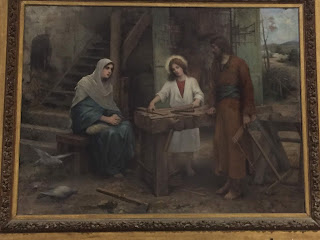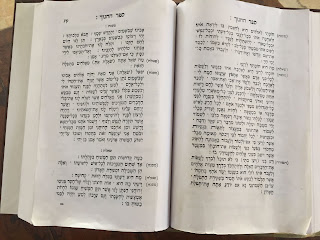On my recent trip to Jerusalem I met a wonderfully brave and compassionate young woman , Stephanie Saldana.
Inspired by Christian vision Stephanie seeks to hear the story of the refugee the migrant and those whose commitment to truth causes them to remain in threatening places.
Extract from:
All Sorts of Little Things.
On
compassion in Time of War
Father Jacques Mourad, a Syrian priest and member of the community, (of
Deir Mar Musa, a Christian monastic
community ) wrote about the renewed significance of wartime dialogue in a letter in 2014, quoted
by Navid Kermani in the pages of this
magazine
[Spring
2016]: "Right now, the kind of dialogue
we're experiencing is our shared suffering as a community. We are sorrowing in this
unjust world, which bears a share of the
responsibility for the victims of the
war, this world of the dollar and the
euro, which cares only for its own
citizens, its own wealth, and its own safety
while the rest of the world dies of hunger, sickness, and war .... The true dialogue we
are living today is the dialogue of compassion."
Since then,
the world has continued to look on as
Syrian innocents have been shot or crushed, gassed or drowned, downed by easily preventable illnesses,
and left to die in too many ways to
mention here.
Is there a way out? I think back to
Father Jacques' words. A dialogue of
compassion, a binding of ourselves
together in love, might be all we have
left - carried out in a world that no longer
cares.
Yet if compassion asks all of us to
"suffer with," it begs the
question: who should . -- we suffer with? To whom should we bind ourselves in this hour of need? If
we listen to the prevailing wisdom not
only in the Middle East but also abroad,
then we should be cautious of who we
choose to suffer with - for there is only
so much suffering the human heart can
bear.
We stand at a precipice. I am
increasingly convinced that the only way
back is to choose to bind ourselves
however possible to every person we
encounter. I say this not out of some naive
hope, but out of a grim reality, that the
alternative is rising nationalism and a brutal sectarianism.
Who will I suffer with? Everyone,
without exception. We can only hope to
be saved together.
These days, when I am tempted
to give up, I often think of Christian
de Cherge, the prior of the monastery
of Tibhirine, the monastic community of
French Cistercian monks who decided to
remain in Algeria during the country's
civil war so as not to abandon their
Muslim neighbors. Seven of the monks,
including Christian, eventually lost ntheir lives due to their fidelity. Pope
Francis recently recognized them as
martyrs, clearing the way for their
beatification.
During the period leading up to their deaths, Christian wrote often of the
monks' "martyrdom of love" -
not their eventual deaths, but their
choice to live out - day by day, moment
by moment - a solidarity with the
suffering of those with whom they shared their daily lives. Remarking that their
choice to stay was a choice to live
"in constancy" with others who
suffered, he placed the brothers in
communion with the Muslims with whom they
lived, noting that "this place [Algeria] has other inhabitants who are also our brothers
in constancy in this difficult
time."
He often returned to the example of
Christ washing the feet of his disciples
before his Passion. In a Holy Thursday
sermon, Cherge wrote: "From
experience, we know that small gestures
cost a lot, especially if they are repeated each day. We wash the feet of
our brothers on Holy Thursday, but what
would it be like to do this daily? And
to all who come?"
For Cherge, martyrdom of love is
accomplished only through "all sorts of little things."
AII sorts of little things. What
kinds of little things? Might we also learn
them?
For when I think about this moment
we find ourselves in, it is not the
bombed-out cities that frighten me most,
the ravaged homes and mosques, churches
and town squares - though these losses
are devastating.
It is the destroyed relationships. In
this I fear that all of us have become
guilty, be it from the hatred that has
built up in our hearts, to the indifference
- its own form of violence - that has
kept us from caring anymore. We have come
to believe the fiction that we can live without
one another. There will be no brick and
mortar that will repair this, no shortcut
that will bring us back again after we have so dehumanized others and in doing so
lost much of our own humanity. We will
only make our way back day by day, moment
by moment, through all sorts of little
things.
I have witnessed these little things
carried out by ordinary people, often
refugees, who have discovered within
their hearts some wellspring of kindness
that survived war and displacement. It is in large part because of them that I have not given up yet. I think of
a young refugee who fled years of
bloodshed in Deir ez-Zor in Syria and
was stranded on an island in Greece. He
sat his friend down in a folding chair
outside the camp and lovingly gave him
a haircut. I stood back in awe,
witnessing this little thing.
Or Sanaa, a Syrian woman I met in
Jordan who lost her brother in the war,
and who I watched leaning over a kitchen
table and helping her son with his
homework.
An exhausted Palestinian day laborer
who gave up his seat on the bus after a
day of work, recognizing that an old man
was carrying a heavier burden, still.
A Syrian priest who was kidnapped
and escaped, forgiving the one who
betrayed him.
A former prisoner who still bore the
scars of torture on his body, singing as
he prepared a meal for his friends.
A community of monks and nuns,
who decided to stay.
How can God possibly be indifferent
to such gestures? How can any of us?
When we have given up on institutions to
save us, on governments or aid agencies,
on political leaders, we place our hope
in these small, almost invisible acts to
repair the world. Little things are
elevated to their proper place in the story
of salvation, as miracles, a dialogue of
pots and pans, often carried out by anonymous saints - mothers and fathers and their
children, gardeners and bakers - who
remind us through their tenderness how
to be human again.
Somewhere in a Syrian village, a
father plants a tree. A young man
crosses the sea with his violin wrapped
in cellophane. A Muslim man walks into a
Christian chapel in a country at war,
turns toward Mecca, and joins the two communities
in prayer.































































